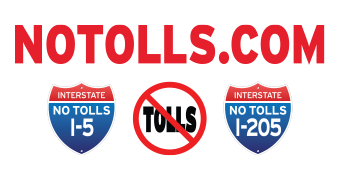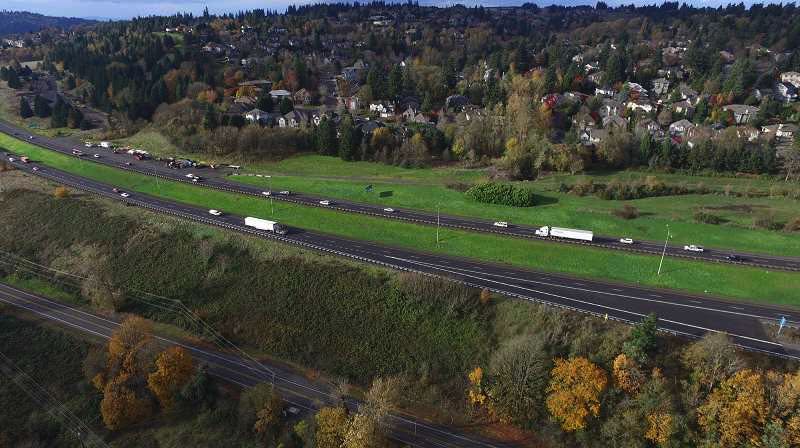Tolling in Oregon: What each gubernatorial candidate says
By Jules Rogers
https://pamplinmedia.com
Pamplin Media Group spoke with candidates Democrat Tina Kotek, Republican Christine Drazan, and Independent Betsy Johnson about the proposed tolls on I-5 and I-205. Here’s what each had to say.
Christine Drazan

Drazan told Pamplin Media Group that one major reason the tolls are being considered a necessary funding mechanism is that EV drivers don’t pay the gas tax but still cause wear and tear on the roads. Before considering tolls, Drazan said she would support charging EV drivers per mile.
“When you look at why we have begun to transition to tolling, it’s because the focus has been to move people to EVs,” Drazan said. “But when you look at who gets into these EVs, primarily they’re getting into those vehicles that are very expensive, and they are depending on state and federal rebates to make those cars more affordable, taking the price down — and then those users pay nothing unless they opt in to the pay-per-mile program.”
Drazan said demographically, the people who have benefited and engaged in the movement to EVs are primarily white, affluent Oregonians. According to Drazan, the EV movement has left a “huge gap in funding when it comes to how we’re going to pay for the roads.”
“I believe this conversation should have and needs to start back where the problem began, which is the people who have these EVs aren’t paying their fair share for their usage on the roads,” Drazan said.
Drazan said the EV pay-per-mile program has voluntary participation, but should be mandatory.
“They must pay their fair share of the roads through road usage, which we know how to track in those vehicles,” Drazan said.
Drazan said if Oregon does end up needing tolls, she would agree with keeping them low and simple.
“We have got to build roads; that’s essential,” Drazan said. “My issue with tolling, in particular, is that when you’re talking about some of the proposals that have been put forward by the transportation commission, they have 100% picked winners and losers, and applied a political overlay to what funding is needed to get these projects completed.”
According to Drazan, discussions for toll proposals among the Oregon Transportation Commission have been too complex, too political and too unfair.
“Instead of talking about tolling that’s a simple toll that’s in place as a finance mechanism and goes away at the end of the life of the loan, they have instead started talking about demand pricing, congestion pricing,” Drazan said. “And if you’re in a Prius at this time of day, you’re not going to have to pay, but if you’re in high-peak hours and in a car that’s gas-powered, you’re going to pay even more.”
Drazan said that road funding hasn’t been structured like the income tax but has been dependent on funds like the gas tax.
“All of these things pick winners and losers, when what we really need to do is pay for roads, have strong roads that allow for the movement of people to get across our state, and we need to figure out how to fund and pay for it,” Drazan said. “But the process for how we finance these projects should not and cannot be a political expression, and that’s how the discussions have gone.”
Drazan said keeping the tolls low and fair across the board would be less of a challenge.
“But, we can only keep the tolls low if we recognize the people who are in these EVs haven’t been paying their fair share, and they’re also using the roads every single day — and oh, by the way, those are very, very heavy cars,” Drazan said. “My goal would be, if we’re doing tolling, to keep it low, keep it even and end the program after you’ve paid for the road.”
Betsy Johnson

Johnson told Pamplin Media Group she supports “mosaics of funding” methods for Oregon’s roads first, such as bonds and repurposing ODOT funds as substitutes for proposed tolls — as well as more federal support.
“With the diminishing use of gasoline … we’ve got to find substitutes. Some of those substitutes could be bonding, some of that substitution could be repurposing some of the money that ODOT is choosing to prioritize in other places,” Johnson said. “The least popular is tolling. I know ODOT is looking at that and has kind of got their horse hitched to that wagon, and I think if that makes it to the ballot, it fails dramatically.”
“There’s going to be a public perception piece of this and a public acceptance piece of whatever the funding is,” Johnson said, noting the unpopularity of the toll proposals. “If I were running for queen instead of governor, (I would) diminish the litigation around every project that comes forward, where everybody with a postage stamp has standing to litigate.”
Also, Johnson said there should be more federal support for I-5 infrastructure and maintenance because it is of national interest as a major north-south thoroughfare throughout the West Coast for freight and commerce.
“It shouldn’t fall disproportionately on Oregonians and Washingtonians to pay for. There’s a national interest in keeping our state system up and vibrant,” Johnson said. “Asking working people to pay the kind of tolls that ODOT is envisioning is going to be really problematic. There are probably mosaics of funding that could be put together, and from that, I mean the Columbia River Crossing (Interstate Bridge Replacement Program) and, frankly, improvements on the I-5 system.”
Johnson said if the traffic were to leave I-5 for smaller, alternative routes as a result of tolls, it could be terribly damaging.
“How do truckers get to the distribution centers at Swan Island and other freight terminals, and get supply into stores? I would want to make sure we had a very clear knowledge that we aren’t pushing traffic into residential areas if we’re moving flows of traffic,” Johnson said. “If I’m the governor, I would want to hear from guys on the ground to understand what their concerns were as we proceed to explore one possible solution versus another.”
Tina Kotek

Kotek told Pamplin Media Group that Oregon needs ways to continue to maintain its existing roads, transition to cleaner vehicles, and upgrade the bridges safely.
“I’m going to be very honest with people,” Kotek said. “To maintain the infrastructure we have in the metro area, what I can commit is that as it starts — and I know it’s underway now with the Abernethy Bridge — is making sure that we’re transparent about what we’re trying to do, what the cost will be, how the traffic will happen.”
Kotek pledged honesty throughout the process, and support for Oregon’s transition to EVs as well as funding for infrastructure maintenance and improvements.
“When other people say we don’t need this, they’re not being honest of how … we’re just maintaining the current infrastructure we have,” Kotek said. “We must replace the apparatus bridge, and it needs to be seismically sound. It needs to be safer — we all agree with that. I want to make sure that as we maintain our system, we’re doing it in as fair a way as possible, and I think we just have to have an honest conversation about this.”
Kotek said she would work within existing systems to make progress.
“People are going to drive their electric vehicles on something, right? So, we need to maintain our car infrastructure — and we have to be able to pay for it,” Kotek said. “The gas tax is a source of diminishing revenue because if we’re moving to zero-emission vehicles, that’s the goal we need to get there.”
Kotek said she would want to look into what programs the state already has to support lower-income households that the tolls would disproportionately impact. She also said public transit options would continue to be critical.
“If we talk about increased cost to move around, we have to provide more options, and transit has to be a part of that. … I know things have been hard in the pandemic, but when we cut bus lines, people don’t have options,” Kotek said. “If we want people to actually take the bus or the light rail to get somewhere, it has to work better. No one’s going to go downtown.”
Kotek also said the 2017 Transportation package was the most comprehensive, innovative package in Oregon, and the state’s first time having a statewide transit fund.
“It’s the whole transition: We all have to go for it,” Kotek said. “We have to have roads. We need to get into cleaner vehicles. How do you pay for the roads you need? … I think that, fortunately, we have that ready to go. We just haven’t really expanded it.”


